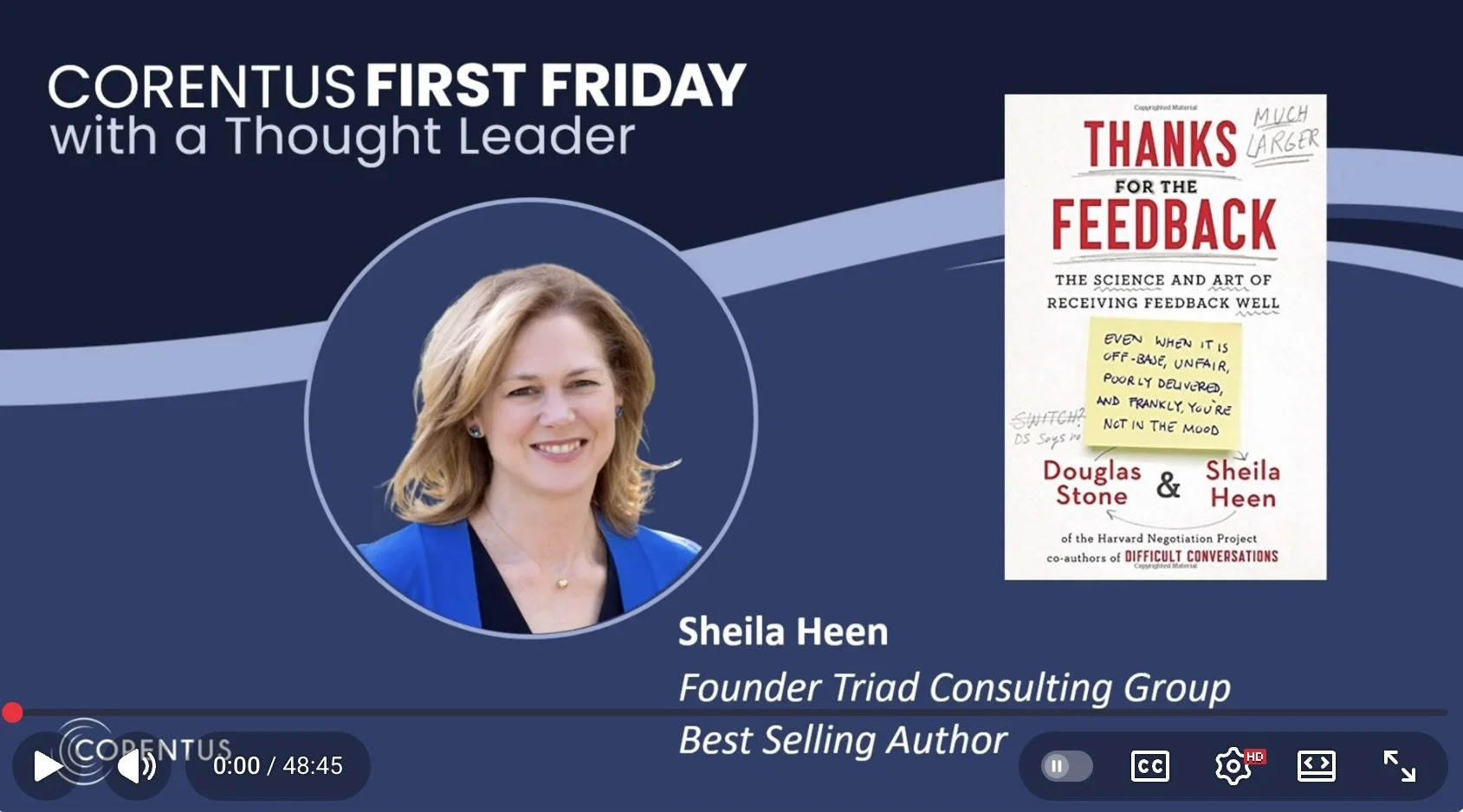Sheila Heen
Thanks for the Feedback
Sheila gives vital insights on transforming workplace dynamics by mastering the art of receiving feedback. Drawing from her book Thanks for the Feedback (co-authored with Douglas Stone), Sheila highlights a major imbalance in professional development.
Sheila Heen
Sheila Heen is a best-selling author, the Founder of Triad Consulting Group, and a Professor at Harvard Law School. She also serves as Deputy Director of the Harvard Negotiation Project, where she has spent 30 years specializing in high-stakes negotiations at the intersection of emotions and relationships. Sheila has worked with executive teams and organizations worldwide, helping leaders navigate conflict and collaboration. She is co-author of Difficult Conversations and Thanks for the Feedback, and her work has been featured on Oprah, NPR, Fox News, and CNBC.
For you from Sheila & Corentus
From the First Friday with a Thought Leader event
Key Insights (below) & YouTube (48:45)
Learn more about Sheila Heen
“Thanks for the Feedback ” (48:45)
KEY INSIGHTS | from our First Friday with a Thought Leader Event
Sheila Heen “Thanks for the Feedback”
• The Insight That Sparked Thanks for the Feedback: The session began by examining the core insight that led to the book. Sheila Heen shared that although feedback was consistently identified as a top “difficult conversation,” focusing on giving feedback better did not solve the issue.
• Initial Problem: Givers found that even after training, their feedback was still not well received and often concluded the effort wasn’t worth it.
• The Core Insight: Co-author Doug Stone recognized that the real leverage point in any feedback exchange is the receiver, not the giver.
• A New Direction: This led to a focus on understanding the human challenges of receiving feedback and how triggered reactions interfere with learning. Improving one’s ability to receive feedback emerged as a distinct and essential leadership skill.
• The Fundamental Dilemma of Receiving Feedback: At the center of feedback difficulty is a tension between two fundamental human needs.
The Need to Learn and Grow: Research shows that mastery, improvement, and progress contribute significantly to well-being. This need suggests we should welcome feedback.
The Need for Acceptance: Humans also want to be valued and respected for who they are right now.
• Feedback creates a direct conflict between these needs. Being told we need to change can feel like a threat to belonging or identity. This tension explains why learning is inherently uncomfortable.
• The ACE Framework for Understanding Feedback: Heen introduced a framework that separates feedback into three types, each serving a different purpose.
Appreciation: Connects and motivates. Signals “I see you, you matter.” Lack of appreciation undermines a person’s ability to receive coaching or evaluation.
Coaching: Helps someone grow more effective or skillful. Can include guidance, correction, modeling, or suggestions.
Evaluation: Rates or aligns someone against expectations or standards. Often, the most emotionally charged and is frequently confused with coaching.
• Strategies for Strengthening Feedback Culture at the Individual Level: Heen emphasized that most people ask for feedback in ways that produce vague, unhelpful answers. The more effective approach is to ask: “What’s one thing…?”
Examples include:
◦ “What’s one thing I could change that would make a difference for you?”
◦ “What’s one thing I’m doing — or not doing — that gets in the way?”
◦ “What’s one thing we could improve about our morning meeting?”This question produces specific, actionable coaching and signals genuine openness to improvement.
• Strategies for Teams: Building Norms and Safety: Effective feedback requires psychological safety, where people can speak without fear of blame or negative repercussions.
• Public vs. Private Contexts: Appreciation is powerful publicly, but coaching and evaluation require higher trust and often belong in a private setting.
• The “Getting the Best Out of Me” Template: Helps teammates clarify preferences around receiving feedback, including pet peeves, what makes them feel appreciated, and how to recognize when they are triggered.
• Onboarding: The most critical conversation happens between a new team member and their manager, as that relationship anchors their early experience.
• Strategies for Leaders: Modeling Effective Receiving: The fastest way to shift a team’s feedback culture is for leaders to openly model how to receive feedback skillfully.
• Role Modeling: Asking for feedback and naming one’s own reactions (“I’m having a reaction — I probably don’t understand this yet.”) sets a norm for others.
• The Megaphone Effect: Leaders must remember that hierarchy amplifies their words — a casual comment may be felt as heavy evaluation.
• Listening for Indirect Feedback: Because people often hesitate to give upward feedback, leaders must listen for subtle cues and invite more candid conversation.
• Additional Key Concepts from Thanks for the Feedback: The session also highlighted several important ideas from the book.
• The Three Triggers:
1. Truth Triggers: “That’s wrong.”
2. Relationship Triggers: “Why is this person giving me feedback?”
3. Identity Triggers: “What does this say about who I am?”
• Individual Sensitivity: Emotional sensitivity to feedback varies by up to 3000% across individuals. The same comment can land as trivial or deeply upsetting depending on the person. As Doug Stone notes, “If you don’t know whether you’re sensitive, you’re not.”
" In any exchange of feedback between a giver and a receiver, it's really the receiver who's in charge, because it's the receiver who decides what to let in and what sense to make of it and whether and how they decide to change”
- Sheila Heen
First Friday with a Thought Leader is a monthly live event for the Corentus Community of Professionals Advancing Team Effectiveness.
Interested in being a member of this professional community and/or receiving our monthly enewsletter? Let us know:



